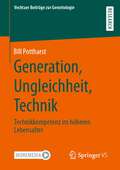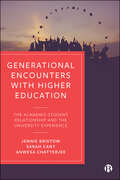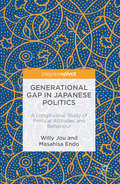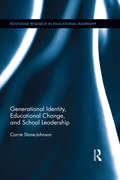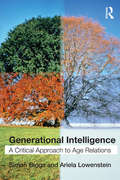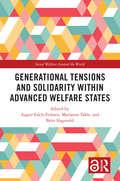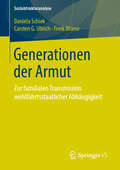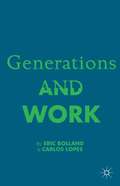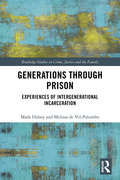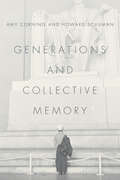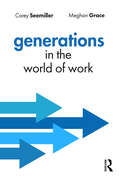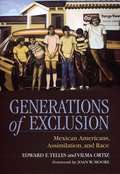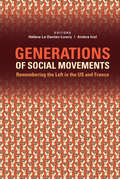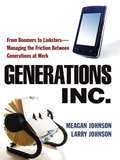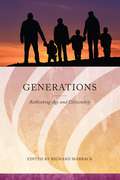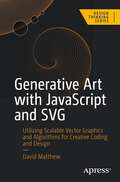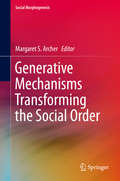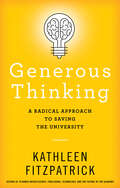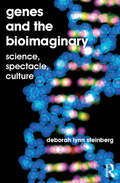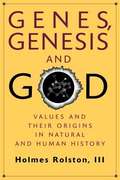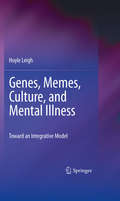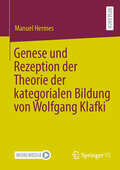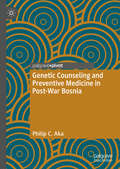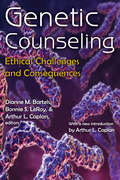- Table View
- List View
Generation, Ungleichheit, Technik: Technikkompetenz im höheren Lebensalter (Vechtaer Beiträge zur Gerontologie)
by Bill PottharstIn diesem Buch wird versucht, die Theorieansätze der Technikgenerationen mit jenen der sozialen Ungleichheit auf eine Weise zu verbinden, dass Rückschlüsse auf die Technikakzeptanz, die Technikkompetenz und die Techniknutzung im höheren Lebensalter abgeleitet werden können. Technikroutinen werden im höheren Lebensalter insbesondere durch Prägungen im Lebensverlauf und die soziale Lage in der aktuellen Lebenssituation bestimmt. Unerlässlich scheint, älteren Menschen Zugang zu neuen Technologien zu ermöglichen, ihnen jedoch ebenso genügend Freiraum dafür einzuräumen, auf den Einsatz ungewollter Technologien verzichten zu können.
Generational Diversity at Work: New Research Perspectives
by Emma ParryOver the past decade much attention has been paid to the apparent differences in consumption preferences or workplace attitudes and behaviours across generations. Within Western economies such as the USA, UK and Australia, it is commonly assumed that that there are now four generations in the workplace, namely Veterans (born 1925-1942), Baby Boomers (1943-1960), Generation X (1961-1981) and Generation Y (1982- 2000) The concept of generational differences at work is one that has recently been adopted by practitioners as a basis on which to design human resource management and career management practices. However, there has been some concern in academic circles about the validity of the notion of generations and the evidence base that supports it. There is therefore a need for new perspectives and methodological approaches to investigating generational differences at work in order to establish the validity and value of generations as an axis of diversity. Generational Diversity at Work: New Research Perspectives will address this need by presenting and discussing research into generational diversity that adopts a range of new theoretical perspectives or methodological approaches. This book is designed as a first step in addressing the need to critically examine the theoretical and empirical basis for generational differences and to provide some new empirical data in this area.
Generational Encounters with Higher Education: The Academic–Student Relationship and the University Experience
by Jennie Bristow Sarah CantThe 21st century has witnessed significant changes to the structures and policies framing Higher Education. But how do these changes in norms, values, and purpose shape the generation now coming of age? Employing a generational analysis, this book offers an original approach to the study of education. It explores the qualitative dimensions of the relationship between academics and students, and examines wider issues of culture and socialisation, from tuition fees and student mental health, to social mobility and employment. This is a timely contribution to current debates about the University and an invaluable resource for those interested in education, youth, and intergenerational relations.
Generational Gap in Japanese Politics
by Willy Jou Masahisa EndoAfter decades of stable and seemingly semi-permanent single-party dominance, Japanese politics have gone through fundamental changes since the early 1990s. Government ministries have been reorganised, prime ministerial powers strengthened, and rules for electing the lower house of parliament overhauled. Furthermore, frequent formation, merger, splintering and disappearance of new parties have continued for more than two decades. How do citizens make sense of politics amidst such rapid shifts? The authors address this question by focusing on attitudinal and behavioural changes and continuities with respect to political ideology. They explore what issues citizens associate with ideological terms, where they perceive various parties on a conservative-progressive dimension, and to what extent ideology affects their vote choice. Results of new surveys are also presented to shed light on distinctions between different ideological labels and profiles of radical right supporters. In addition, all topics are discussed with an eye to identifying divergent patterns between older and younger generations.
Generational Identity, Educational Change, and School Leadership (Routledge Research in Educational Leadership #7)
by Corrie Stone-JohnsonGenerational identity plays a large role in how teachers view educational change and school reform. Teachers of the Boomer generation, an era characterized by optimism and innovation, tend to be more resistant to change than those of Generation X, for whom standardization represents the norm, not a shift. This volume reviews five decades of research on educational change and teachers’ varying responses to it from a generational perspective, providing school leaders with insight on how best to relate to these groups to achieve a common goal. Through ongoing professional development oriented by multigenerational grouping, teachers and school leaders can define success and create a multigenerational understanding of what good teaching and leadership look like.
Generational Intelligence: A Critical Approach to Age Relations
by Simon Biggs Ariela LowensteinThe question of communication and understanding between different generations is emerging as a key issue for the twenty-first century. The advent of ageing populations may lead to increased conflict or solidarity in society, and provokes a profound ambivalence both in public and in the private sphere. In a new approach, Biggs and Lowenstein offer a critical examination of Generational Intelligence as one way of addressing these issues. How easy is it to put yourself in the shoes of someone of a different age group? What are the personal, interpersonal and social factors that affect our perceptions of the ‘age other’? What are the key issues facing families, workplaces and communities in an ageing society? This book sets out a way of thinking about interpersonal relations based on age, and the question of communication between people of different ages and generations. The book challenges existing orthodoxies for relations between adults of different ages and draws out steps that can be taken to increase understanding between generational groups. The authors outline a series of steps that can be taken to enhance Generational Intelligence, examine existing theories and social issues, and suggest new directions for sustainable relations between generational groups.
Generational Tensions and Solidarity Within Advanced Welfare States (Social Welfare Around the World)
by Asgeir Falch-Eriksen, Marianne Takle, and Britt SlagsvoldThis book explores generation as both a reference to family or kinship structures, and a reference to cohorts or age sets. The principal objective is branching out this two-part concept through studies of tensions and solidarity within and between generations of advanced and robust welfare states. Answering key questions using multiple disciplinary approaches, the book considers how generations challenge advanced and robust welfare states; how new and young generations are affected by living in an advanced welfare state with older generations; how tensions or solidarity are understood when facing challenges; and what the key characteristics are of certain generation types. It contributes to the development of a more comprehensive generation approach within social sciences by developing the concept of generation by exploring different challenges to the welfare state such as migration, digitalization, environmental damages, demands for sustainability, and marginalization. Highlighting the escalating tensions and altered versions of solidarity between generations, this book shows how a comprehensive concept of a generation can create new insights into how we collectively coordinate and resolve challenges through the welfare state. It will be of interest to all scholars and students of social policy, sociology, political science, and social anthropology.
Generationen der Armut: Zur familialen Transmission wohlfahrtsstaatlicher Abhängigkeit (Sozialstrukturanalyse)
by Carsten G. Ullrich Daniela Schiek Frerk BlomeIn diesem Buch wird einer qualitative Studie zur intergenerationellen Armutstransmission in Deutschland vorgestellt. Anhand von familiengeschichtlichen Mehrgenerationengesprächen mit erwachsenen Mitgliedern unterprivilegierter Familien zeigen die Autor*innen, inwiefern es zur Reproduktion unentrinnbarer Schicksalsgemeinschaften oder zu Abschieden aus diesen kommen kann.
Generations And Work
by Eric Bolland Carlos LopesBased on an extensive national survey of workers and four separate industry-specific surveys, Generations and Work will examine and provide answers to the most common issues and problems of multi generational work by assessing differences and commonalities between and among generations.
Generations Through Prison: Experiences of Intergenerational Incarceration (Routledge Studies in Crime, Justice and the Family)
by Mark Halsey Melissa de Vel-PalumboAround one in five prisoners report the previous or current incarceration of a parent. Many such prisoners attest to the long-term negative effects of parental incarceration on one’s own sense of self and on the range and quality of opportunities for building a conventional life. And yet, the problem of intergenerational incarceration has received only passing attention from academics, and virtually little if any consideration from policy makers and correctional officials. This book – the first of its kind – offers an in-depth examination of the causes, experiences and consequences of intergenerational incarceration. It draws extensively from surveys and interviews with second-, third-, fourth- and fifth-generation prisoners to explicate the personal, familial and socio-economic contexts typically associated with incarceration across generations. The book examines 1) the emergence of the prison as a dominant if not life-defining institution for some families, 2) the link between intergenerational trauma, crime and intergenerational incarceration, 3) the role of police, courts, and corrections in amplifying or ameliorating such problems, and 4) the possible means for preventing intergenerational incarceration. This is undeniably a book that bears witness to many tragic and traumatic stories. But it is also a work premised on the idea that knowing these stories – knowing that they often resist alignment with pre-conceived ideas about who prisoners are or who they might become – is part and parcel of advancing critical debate and, more importantly, of creating real change. Written in a clear and direct style, this book will appeal to students and scholars in criminology, sociology, cultural studies, social theory and those interested in learning about more about families in prison.
Generations and Collective Memory
by Amy Corning Howard SchumanWhen discussing large social trends or experiences, we tend to group people into generations. But what does it mean to be part of a generation, and what gives that group meaning and coherence? It's collective memory, say Amy Corning and Howard Schuman, and in Generations and Collective Memory, they draw on an impressive range of research to show how generations share memories of formative experiences, and how understanding the way those memories form and change can help us understand society and history. Their key finding--built on historical research and interviews in the United States and seven other countries (including China, Japan, Germany, Lithuania, Russia, Israel, and Ukraine)--is that our most powerful generational memories are of shared experiences in adolescence and early adulthood, like the 1963 Kennedy assassination for those born in the 1950s or the fall of the Berlin Wall for young people in 1989. But there are exceptions to that rule, and they're significant: Corning and Schuman find that epochal events in a country, like revolutions, override the expected effects of age, affecting citizens of all ages with a similar power and lasting intensity. The picture Corning and Schuman paint of collective memory and its formation is fascinating on its face, but it also offers intriguing new ways to think about the rise and fall of historical reputations and attitudes toward political issues.
Generations in the World of Work
by Corey Seemiller Meghan GraceGenerations in the World of Work provides invaluable data-informed insights into the intergenerational dynamics in today’s workplaces.Generational experts and authors of Generation Z: A Century in the Making, Corey Seemiller and Meghan Grace present the perceptions, motivations, and preferences of various generational cohorts and share how those shape individual behaviors, communication and collaboration, as well as wider organizational structures and norms. They offer guidance for how to maximize productivity and relationships to navigate dynamics across generational cohorts.Generations in the World of Work offers employees, managers, and organizational leaders guidance for maximizing productivity, relationships, wellbeing, and engagement across generational differences in order to create thriving workplaces that value and leverage each person’s strengths.
Generations of Exclusion: Mexican Americans, Assimilation, and Race
by Edward E. Telles Vilma OrtizForeword by Joan W. Moore. When boxes of original files from a 1965 survey of Mexican Americans were discovered behind a dusty bookshelf at UCLA, sociologists Edward Telles and Vilma Ortiz recognized a unique opportunity to examine how the Mexican American experience has evolved over the past four decades. Telles and Ortiz located and re-interviewed most of the original respondents and many of their children. Then, they combined the findings of both studies to construct a thirty-five year analysis of Mexican American integration into American society. Generations of Exclusion is the result of this extraordinary project. Generations of Exclusion measures Mexican American integration across a wide number of dimensions: education, English and Spanish language use, socioeconomic status, intermarriage, residential segregation, ethnic identity, and political participation. The study contains some encouraging findings, but many more that are troubling. Linguistically, Mexican Americans assimilate into mainstream America quite well--by the second generation, nearly all Mexican Americans achieve English proficiency. In many domains, however, the Mexican American story doesn't fit with traditional models of assimilation. The majority of fourth generation Mexican Americans continue to live in Hispanic neighborhoods, marry other Hispanics, and think of themselves as Mexican. And while Mexican Americans make financial strides from the first to the second generation, economic progress halts at the second generation, and poverty rates remain high for later generations. Similarly, educational attainment peaks among second generation children of immigrants, but declines for the third and fourth generations. Telles and Ortiz identify institutional barriers as a major source of Mexican American disadvantage. Chronic under-funding in school systems predominately serving Mexican Americans severely restrains progress. Persistent discrimination, punitive immigration policies, and reliance on cheap Mexican labor in the southwestern states all make integration more difficult. The authors call for providing Mexican American children with the educational opportunities that European immigrants in previous generations enjoyed. The Mexican American trajectory is distinct--but so is the extent to which this group has been excluded from the American mainstream. Most immigration literature today focuses either on the immediate impact of immigration or what is happening to the children of newcomers to this country. Generations of Exclusion shows what has happened to Mexican Americans over four decades. In opening this window onto the past and linking it to recent outcomes, Telles and Ortiz provide a troubling glimpse of what other new immigrant groups may experience in the future.
Generations of Social Movements: The Left and Historical Memory in the USA and France
by Helene Le Dantec-Lowry Ambre IvolFrench political culture has long been seen as a model of leftist militancy, while the left in the United States is often perceived in terms of organizational discontinuity. Yet, the crisis of social democracy today suggests that at a time when the archetypal European welfare state is in danger, critics and citizens interested in understanding or reviving progressive politics are invited to consider the United States, where modes of creative activism recurrently demonstrate potentialities for a renewed leftist culture. Using a transatlantic perspective, this volume identifies activist influence through the designation or rejection of specific intellectual and militant figures across generations, and it examines various narrative modes used by militants to write their own history.
Generations, Inc.: From Boomers to Linksters--Managing the Friction Between Generations at Work
by Larry Johnson Meagan JohnsonWhen Woodstock meets Facebook at the watercooler.
Generations: Rethinking Age and Citizenship (Series in Citizenship Studies)
by Richard MarbackThe meaning of citizenship and the way that it is expressed by an individual varies with age, develops over time, and is often learned by interacting with members of other generations. In Generations: Rethinking Age and Citizenship, editor Richard Marback presents contributions that explore this temporal dimension of membership in political communities through a variety of rich disciplinary perspectives. While the role of human time and temporality receive less attention in the interdisciplinary study of citizenship than do spatial dynamics of location and movement, Generations demonstrates that these factors are central to a full understanding of citizenship issues. Essays in Generations are organized into four sections: Age, Cohort, and Generation; Young Age, Globalization, Migration; Generational Disparities and the Clash of Cultures; and Later Life, Civic Engagement, Disenfranchisement. Contributors visit a range of geographic locations--including the U.S., U.K., Europe, and Africa--and consider the experiences of citizens who are native born, immigrant, and repatriated, in time periods that range from the nineteenth century to the present. Taken together, the diverse contributions in this volume illustrate the ways in which personal experiences of community membership change as we age, and also explore how experiences of civic engagement can and do change from one generation to the next. Teachers and students of citizenship studies, cultural studies, gerontology, sociology, and political science will enjoy this thought-provoking look at age, aging, and generational differences in relation to the concept and experience of citizenship.
Generative Art with JavaScript and SVG: Utilizing Scalable Vector Graphics and Algorithms for Creative Coding and Design (Design Thinking)
by David MatthewThis book introduces you to the exciting world of generative art and creative coding through the medium of JavaScript and Scalable Vector Graphics (SVG). Using tried and trusted techniques, you’ll tackle core topics such as randomness and regularity, noise and naturalistic variance, shape and path creation, filter effects, animation, and interactivity. In the process you’ll learn SvJs, a JavaScript library that closely mirrors the SVG spec and makes scripting SVG intuitive and enjoyable. You’ll also study the craft of generative art and its creative process, along with JavaScript fundamentals, using modern ES6+ syntax. Each chapter will build upon the previous one, and those completely new to programming will be given a primer to help them find their feet. Generative Art with JavaScript and SVG will take you on a fun journey, peppered with plenty of sketches throughout, designed not only to explain, but to inspire. You Will: • Structure and randomise compositions. • Understand the different types of randomness and their probability distributions. • Create organic variance with the SvJs Noise module. • Apply SVG filter effects in a generative fashion. • Explore different approaches to animating with SVG. • Make your compositions dynamic and interactive. WHO IS IT FOR: Web developers and designers and creative coders with an interest in digital and generative art as well as artists who are interested in learning to code with JavaScript.
Generative Mechanisms Transforming the Social Order
by Margaret S. ArcherThis volume examines how generative mechanisms emerge in the social order and their consequences. It does so in the light of finding answers to the general question posed in this book series: Will Late Modernity be replaced by a social formation that could be called Morphogenic Society? This volume clarifies what a 'generative mechanism' is, to achieve a better understanding of their social origins, and to delineate in what way such mechanisms exert effects within a current social formation, either stabilizing it or leading to changes potentially replacing it . The book explores questions about conjuncture, convergence and countervailing effects of morphogenetic mechanisms in order to assess their impact. Simultaneously, it looks at how products of positive feedback intertwine with the results of (morphostatic) negative feedback. This process also requires clarification, especially about the conditions under which morphostasis prevails over morphogenesis and vice versa. It raises the issue as to whether their co-existence can be other than short-lived. The volume addresses whether or not there also is a process of 'morpho-necrosis', i. e. the ultimate demise of certain morphostatic mechanisms, such that they cannot 'recover'. The book concludes that not only are generative mechanisms required to explain associations between variables involved in the replacement of Late Modernity by Morphogenic Society, but they are also robust enough to account for cases and times when such variables show no significant correlations.
Generous Thinking: A Radical Approach to Saving the University
by Kathleen FitzpatrickCan the university solve the social and political crisis in America?Higher education occupies a difficult place in twenty-first-century American culture. Universities—the institutions that bear so much responsibility for the future health of our nation—are at odds with the very publics they are intended to serve. As Kathleen Fitzpatrick asserts, it is imperative that we re-center the mission of the university to rebuild that lost trust. Critical thinking—the heart of what academics do—can today often negate, refuse, and reject new ideas. In an age characterized by rampant anti-intellectualism, Fitzpatrick charges the academy with thinking constructively rather than competitively, building new ideas rather than tearing old ones down. She urges us to rethink how we teach the humanities and to refocus our attention on the very human ends—the desire for community and connection—that the humanities can best serve. One key aspect of that transformation involves fostering an atmosphere of what Fitzpatrick dubs "generous thinking," a mode of engagement that emphasizes listening over speaking, community over individualism, and collaboration over competition.Fitzpatrick proposes ways that anyone who cares about the future of higher education can work to build better relationships between our colleges and universities and the public, thereby transforming the way our society functions. She encourages interested stakeholders to listen to and engage openly with one another's concerns by reading and exploring ideas together; by creating collective projects focused around common interests; and by ensuring that our institutions of higher education are structured to support and promote work toward the public good. Meditating on how and why we teach the humanities, Generous Thinking is an audacious book that privileges the ability to empathize and build rather than simply tear apart.
Genes and the Bioimaginary: Science, Spectacle, Culture
by Deborah Lynn SteinbergGenes and the Bioimaginary examines the dramatic rise and contemporary cultural apotheosis of 'the gene'. The book traces not only the genetification of modern life but is also a journey through the complex relationship between science and culture. At the heart of this book are three interlinked questions. The first concerns the paradigmatic transformations of the 'genetics revolution': how can we understand the impact of genes on social arenas as diverse as law and agriculture, politics and medicine, genealogy and jurisprudence? Second, how has the language of genes come to pervade public discourse - as much a trope of personal narrative as of the popular imaginary? And third, how can we gain critical purchase not only on the conditions and consequences of a particular science, but on its projective seductions, the terms of its persuasion, and the dilemmas and anxieties provoked in its wake? Through a series of illuminating case studies ranging from 'gay genes' to 'Jew genes', to genes for crime; from CSI to the Innocence Project, from genetics (post)racial imaginary to its phantasies of redemption, the book examines the emergence of the gene as a pre-eminent locus of both scientific and social explanation, and as a powerful object of spectacle, projective phantasy and attachment. Genes and the Bioimaginary makes a distinctive contribution to our understanding of how knowledge comes to be not only powerful, but plausible.
Genes, Genesis, and God: Values and Their Origins in Natural and Human History
by Holmes Rolston IIIHolmes Rolston challenges the sociobiological orthodoxy that would naturalize science, ethics, and religion. The book argues that genetic processes are not blind, selfish, and contingent, and that nature is therefore not value-free. The author examines the emergence of complex biodiversity through evolutionary history. Especially remarkable in this narrative is the genesis of human beings with their capacities for science, ethics, and religion. A major conceptual task of the book is to relate cultural genesis to natural genesis. There is also a general account of how values are created and transmitted in both natural and human cultural history. The book is written by one of the most well-respected figures in the philosophy of biology and religion.
Genes, Memes, Culture, and Mental Illness
by Hoyle LeighWhat produces mental illness: genes, environment, both,neither? The answer can be found in memes--replicable units of information linking genes and environment in the memory and in culture--whose effects on individual brain development can be benign or toxic. This book reconceptualizes mental disorders as products of stressful gene-meme interactions and introduces a biopsychosocial template for meme-based diagnosis and treatment. A range of therapeutic modalities, both broad-spectrum (meditation) and specific(cognitive-behavioral), for countering negative memes and their replication are considered, as are possibilities for memetic prevention strategies. In this book, the author outlines the roles of genes and memes in the evolution of the human brain; elucidates the creation, storage, and evolution of memes within individual brains; examines culture as a carrier and supplier of memes to the individual; provides examples of gene-meme interactions that can result in anxiety, depression, and other disorders; proposes a multiaxial gene-meme model for diagnosing mental illness; identifies areas of meme-based prevention for at-risk children; and defines specific syndromes in terms of memetic symptoms, genetic/ memetic development, and meme-based treatment.
Genese und Rezeption der Theorie der kategorialen Bildung von Wolfgang Klafki
by Manuel HermesWolfgang Klafki ist einer der zentralen deutschen Erziehungswissenschaftler in der zweiten Hälfte des 20. Jahrhunderts. Seine 1959 publizierte Dissertation über "Das pädagogische Problem des Elementaren und die Theorie der kategorialen Bildung" etablierte ihn mit einem Schlag in der ersten Riege der Erziehungswissenschaft der jungen Bundesrepublik. Weitgehend unbekannt ist bis heute, dass und inwiefern er seine Theorie der kategorialen Bildung bereits in der erst 2013 veröffentlichten Staatsexamensarbeit von 1951 ausgearbeitet hat. Die Studie von Manuel Hermes nimmt ihren Ausgang von jener frühesten Arbeit Klafkis und zeichnet von dort aus die Genese der Theorie der kategorialen Bildung in ihrer ursprünglichen Entstehung und werkimmanenten Entwicklung von 1951 bis 2007 nach. Im Anschluss daran untersucht Hermes die erziehungswissenschaftliche und didaktische Rezeption der Theorie der kategorialen Bildung. Er legt damit ein unverzichtbares Standardwerk für jede künftige Forschung zum Thema vor.
Genetic Counseling and Preventive Medicine in Post-War Bosnia
by Philip C. AkaGenetic Counseling and Preventive Medicine in Post-War Bosnia offers a unique new perspective to longstanding debates on healthcare reforms in Bosnia. In this penetrating analysis, Philip C. Aka argues that twenty-five years after the ethnic war that shook Bosnia and Herzegovina to its foundations, healthcare reforms are a function of preventive medicine, defined as genetic counselling, backed by tobacco and alcohol control. At its core, the book offers a fresh examination of healthcare reforms in Bosnia set in the multidisciplinary field of bioethics, supplemented by comparative health studies, and comparative human rights. By offering an extensive list of electronically accessible literature on healthcare accessible in the public domain, Aka delivers an exemplar of research possibilities in the Information Age.
Genetic Counseling: Ethical Challenges and Consequences
by Dianne M. Bartels Arthur L. Caplan Bonnie S. LeRoyGenetic counseling is fairly new. The fact that the field is an accepted professional enterprise in universities, clinics, and hospitals throughout the United States is remarkable. The contributors argue that genetics and medicine rest on beliefs widely held in American society. Scientific progress is good, and highly sophisticated technologies are appropriate means to solving medical problems. The better understanding they gain about the nature and evolution of disease, the more prepared clinicians will be to treat and prevent future occurrence of disease. A belief that medicine, including genetic medicine, is clear, factually based, and objective undergirds the strategies and norms of genetic counseling. This collection of original papers explores the history, values, and norms of that process, with focus on the value of non-directiveness in counseling practice. The contributors' examination of genetic counseling issues serves as a foundation from which to address the ethical, legal, and policy considerations of clinical genetics.
